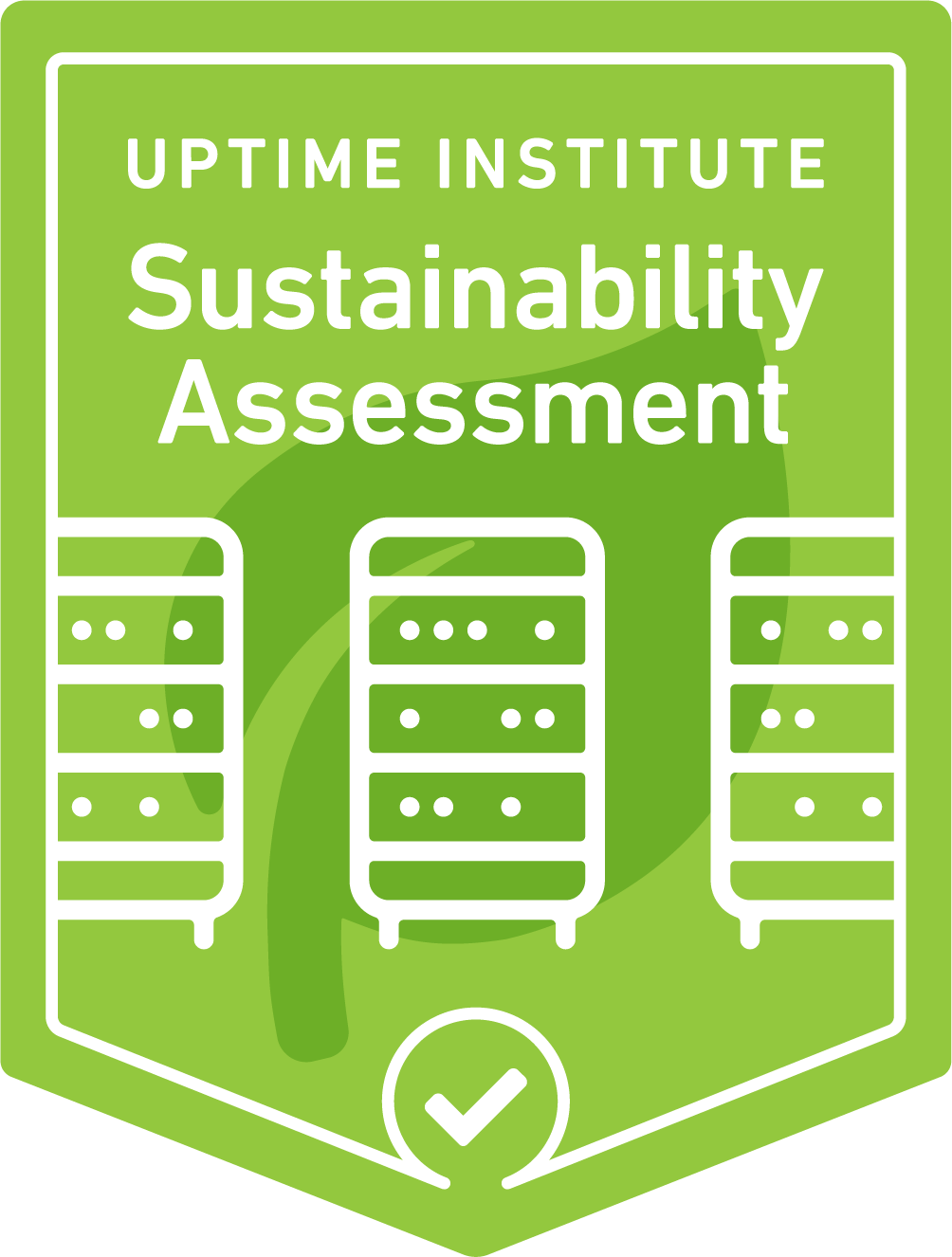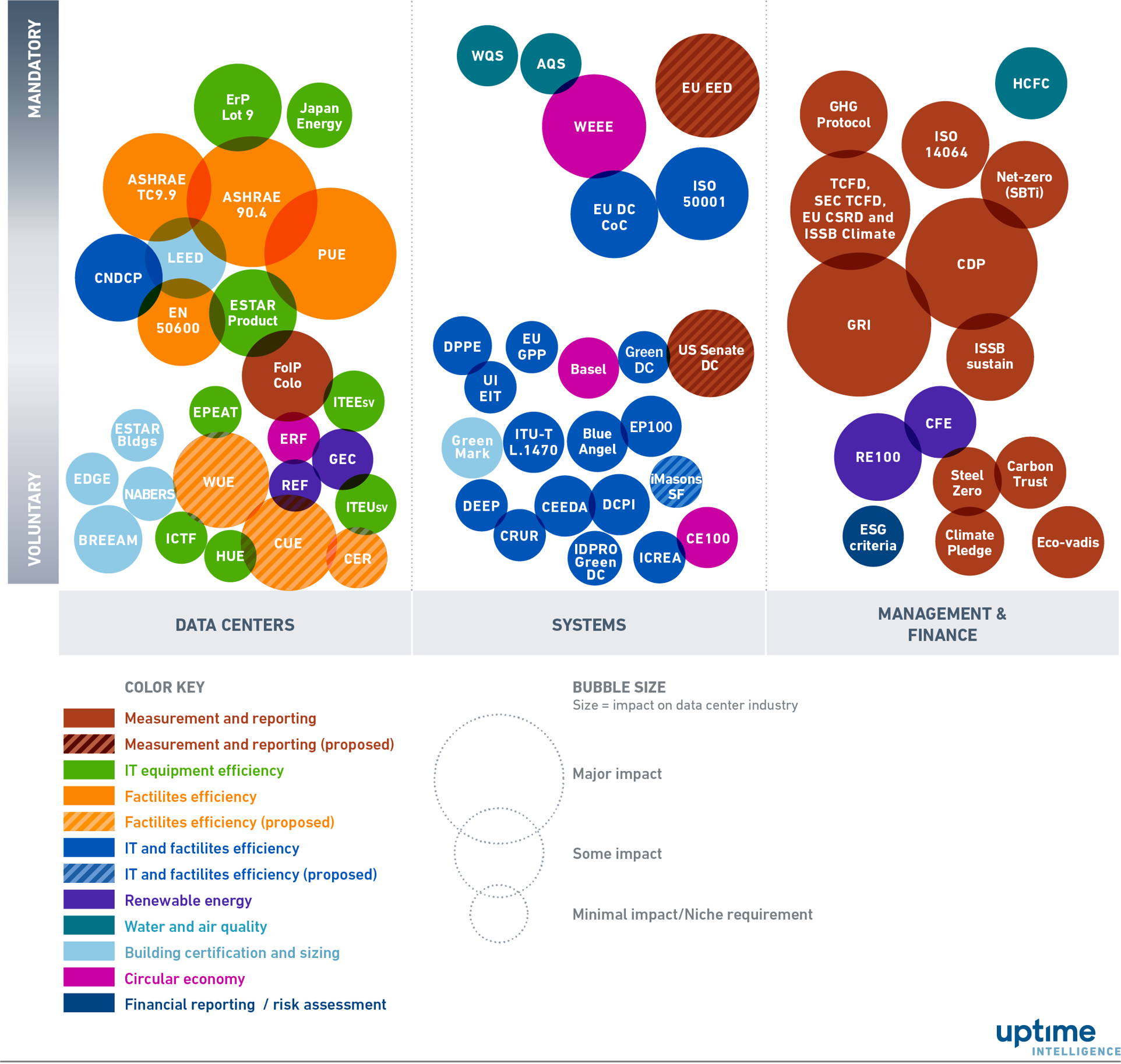Évaluation de la durabilité
L'évaluation du développement durable d'Uptime Institute aide les organisations à identifier, documenter, suivre et générer des rapports sur les programmes de développement durable dans l'ensemble de leur parc informatique, y compris les centres de données exploités par l'entreprise, les fournisseurs de colocation, les partenaires cloud et hyperscaler et les fournisseurs de services gérés.
L’évaluation fournit aux organisations une approche neutre vis-à-vis des fournisseurs afin d’évaluer de manière cohérente la durabilité de bout en bout de leur infrastructure numérique à travers les zones géographiques, les types de déploiement et les architectures en utilisant des critères qui ne réduisent pas la fiabilité ou la résilience.
L’évaluation est basée sur plus de deux décennies d’expérience dans la conception de programmes de durabilité d’infrastructure numérique et la mise en pratique de ces programmes.
Les clients de l’évaluation du développement durable apprennent quelles initiatives de développement durable peuvent aider à réduire les dépenses d’exploitation, comment réduire l’impact environnemental de leurs centres de données et démontrer leurs réalisations en matière de développement durable aux parties prenantes internes et externes avec un prix Uptime Institute Sustainability Assessment.
Contactez-Nous
Éclairé par l’industrie, conçu par des experts
Bien qu’il existe de nombreuses normes existantes qui comprennent des éléments de durabilité des centres de données, la plupart sont des évaluations étroitement axées sur la construction neuve ou uniquement sur la consommation d’énergie. De nombreuses autres normes manquent de compréhension approfondie des infrastructures critiques, ce qui entraîne des recommandations susceptibles de compromettre la fiabilité ou la résilience. Enfin, il existe un certain nombre d’évaluations proposées par les fournisseurs et les prestataires de services, ce qui entraîne des recommandations biaisées vers des produits ou des solutions spécifiques pour résoudre les défis de durabilité.
Pour développer notre évaluation de la durabilité, Uptime s’est associé à plus de deux douzaines d’entreprises et de prestataires de services de classe mondiale représentant des centaines de centres de données et plus de trois gigawatts de capacité de centre de données installée et opérationnelle dans 38 pays. Nous avons analysé plus de 150 normes, réglementations et lois actuelles et proposées dans le monde entier.
Ce processus de développement a permis de garantir que notre évaluation de la durabilité est applicable à l’échelle mondiale, et que l’industrie est acceptée car elle prend en compte les exigences locales et régionales, la faible teneur en carbone et la disponibilité des ressources vertes, ainsi que les conditions climatiques.
Composants de l’évaluation de la durabilité
L’évaluation de la durabilité de l’Uptime Institute couvre tous les aspects de la durabilité des datacenters, y compris la consommation d’énergie et d’eau, les émissions et les déchets.
Les 14 catégories clés de l’évaluation sont décrites ci-dessous et comprennent plus de 50 sous-catégories couvrant des disciplines telles que les opérations et la gestion informatiques, les opérations et la gestion des installations et les domaines interfonctionnels.
Cette granularité fournit aux organisations une spécificité leur permettant de comprendre où elles excellent et quels domaines doivent être améliorés.Opérations et gestion informatiques
Opérations et gestion des installations
Domaines interfonctionnels
Calendrier, livrables et résultats
L’évaluation de la durabilité est exécutée au niveau de l’installation, mais la plus efficace lorsqu’elle est réalisée sur un portefeuille de sites. Les évaluations à l’échelle du portefeuille permettent aux sites d’être comparés les uns aux autres.
L’évaluation commence par un appel d’orientation et de définition de la portée avec votre équipe, et progresse vers une visite sur plusieurs jours du site où le personnel d’Uptime évalue l’équipement, les processus et les procédures, la documentation et les données comme éléments clés de l’évaluation.
Le rapport final est remis au client et comprend :
- Résumé exécutif des résultats de l’évaluation
- Liste de recommandations prioritaires pour améliorer les performances
- Matrice des résultats présentant les scores dans les 14 catégories clés et plus de 50 sous-catégories
- Analyse comparative des données pour comparer les résultats dans votre domaine informatique
- Évaluation de chaque établissement par rapport aux critères émergents de rapport et d’évaluation spécifiques au centre de données
- Inventaire de toutes les mesures de durabilité saisies pendant l’évaluation
Les clients qui reçoivent une note de réussite pour l’évaluation du développement durable recevront un prix Uptime Institute Sustainability Assessment qui peut être affiché dans l’établissement, sur le site Web de votre entreprise, dans votre documentation d’entreprise et sur le site public Uptime Institute pour démontrer vos réalisations en matière de durabilité de l’infrastructure numérique.

Vous cherchez plus d’informations sur l’évaluation du développement durable ?
Les plus grandes marques au monde se tournent vers Uptime Institute for Data Center Expertise





































































Ressources connexes
Uptime Institute a plus de vingt ans d'expérience dans l'aide aux organisations du monde entier pour identifier, gérer et réduire l'impact environnemental de leur infrastructure numérique. Vous trouverez ci-dessous quelques-unes de nos ressources connexes.
Évaluation de la durabilité des datacenters : Analyse comparative et meilleures pratiques
Découvrez comment identifier les initiatives de durabilité qui peuvent aider à réduire l’impact environnemental et les dépenses d’exploitation des datacenters sans compromettre la disponibilité et la résilience de l’infrastructure numérique essentielle à la mission.
Sevices de Durabilité
En savoir plus sur le portefeuille de services d'Uptime en matière de durabilité des datacenters.
Durabilité de l’infrastructure numérique – Guide du responsable
Cette série s’inscrit dans le cadre des efforts continus, et en expansion, d’Uptime pour informer, guider et soutenir les efforts de durabilité dans le secteur des infrastructures numériques.
Éducation sur le temps de disponibilité
Uptime propose deux programmes éducatifs axés sur les professionnels de la durabilité des datacenters. Pour en savoir plus sur nos programmes CDCSP® (Certified Data Center Sustainability Professional) et Accredited Sustainability Advisor, consultez notre page d’éducation.

